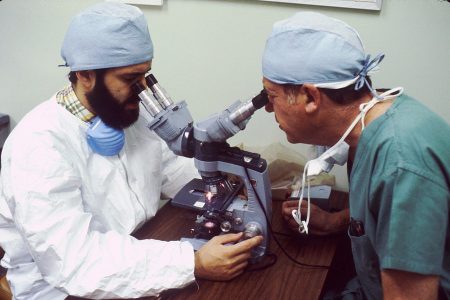- Eureka, a brand-new scientific discovery! Also, ow, my arms!
Many inventions and scientific discoveries were made by total accident. But that was easy in the ages past when we didn’t actually know much about the ways of nature.
These days, accidental scientific discoveries are becoming increasingly rare. It can still happen, though, as one unfortunate Englishman demonstrated.
He received a bacterial infection from the bite of a stray cat that turned his arms into grotesquely swollen balloons. That’s nothing unusual in itself — feral animal bites generally aren’t good for you.
But when doctors tried to identify the bacteria, they had no idea what they were looking at.
As it turns out, the man somehow managed to get infected with a bacterial strain completely unknown to modern science. The age of accidental discoveries clearly isn’t over yet.
The good news is that this story has a happy ending. The bacteria responded to medical treatments and the man has reportedly recovered completely from his infection.
Additionally, doctors can now study the new disease vector and develop more effective treatments for it. Everybody wins!
Well, except maybe the man who risked losing his arms.

Turning into Popeye the Sailor
The medical incident actually happened three years ago in 2020. The results were just reported recently since researching unknown bacterial strains isn’t exactly a fast process.
It all began when a 48-year-old British man came to an emergency room. He was reportedly “obese” but otherwise healthy and had a normally functioning immune system.
He had recently had a run-in with a single feral cat. During the tussle, the cat had bitten the man several times.
It became clear over the following eight hours that something was wrong. His hand began to swell to the point that the man decided it was time to get medical attention.
Assuming this was just a regular case of cat scratch fever, the doctors cleaned the man’s wounds and gave him a tetanus shot and a bottle of antibiotics. They then sent him on his way, figuring out that was the end of the story.
The next day, the man came back.
Whatever the doctors had done hadn’t helped him at all. By this point, the middle and pinky fingers of his left hand were so swollen that he was in constant pain.
The swelling had also spread to both of his forearms, making him look like real-life Popeye the Sailor.
To save his arms, the doctors had to surgically cut away the infected tissue around the man’s wounds. They gave him a delicious cocktail of three different intravenous antibiotics, together with new oral ones.
This time, the man got lucky and the treatment worked. His hands returned to normal and he reportedly retains full use of them.
‘Distinct and Undescribed Species’
But why didn’t the original antibiotics treatment work? The doctors wanted to know that as well, so they examined the bacteria they’d extracted during the surgery.
What they found made them scratch their heads. The bacteria looked kind of like Streptococcus bacteria, but not like any the doctors were aware of.
Streptococcus strains cause a number of illnesses, like strep throat, meningitis, pink eye, and so on. It would’ve made sense that the extracted bacteria belonged to this family.
Once the researchers cracked open the bacterium’s genome, though, they found that it didn’t match any bacteria on the record. It was an utterly new, previously unknown bacterial strain.
Further research revealed that the bacteria belonged to the genus Globicatella, so far associated with infections in the blood, heart, and urinary tract. But even in this family, the new strain is an oddity, sharing only around 80% of its genome with previously known strains.
According to researchers, it’s a “distinct and previously undescribed species.”
The British man got lucky, though. Antibiotics managed to kill this new Globicatella strain — unlike its previously known relatives, which resist most common antibiotics.
“This report highlights the role of cats as reservoirs of as yet undiscovered bacterial species that have human pathogenic potential,” the researchers warn.
Let this be a lesson to us all. No matter how cute that stray kitty is, it’s best to steer clear of it.
After all, losing your arms to infection really isn’t the way you want to make a groundbreaking medical discovery.
Hits: 0












